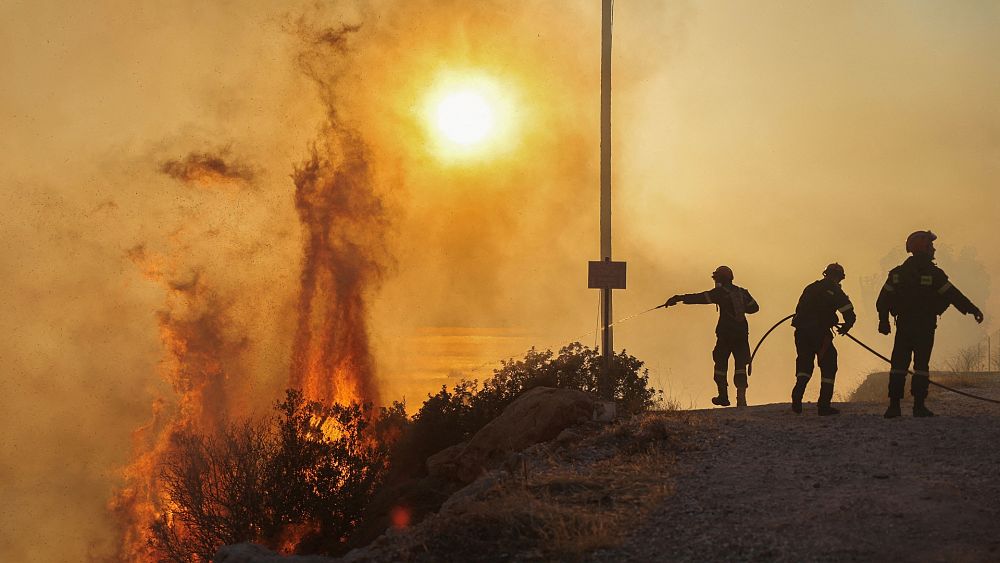
Temperatures are threatening to exceed Europe’s all-time high of 48.8C this week.
A new anticyclone named Charon, after the boatman who ferries souls to the underworld in Greek mythology, is causing the extreme heat. Amplified by climate change, it is expected to persist until the end of the week at least.
High temperatures have led to widespread wildfire alerts and health warnings across southern Europe.
Spain’s Aemet weather agency has said that the heatwave will “affect a large part of the countries bordering the Mediterranean” this week. Temperatures could soar in southern parts of the country to over 42C but are likely to start dropping on Wednesday.
It comes after a wildfire started in La Palma in Spain’s Canary Islands on Saturday. Around 4,600 hectares of land and roughly 20 homes and buildings were burnt. Weaker winds and cooler weather that arrived on Monday have helped firefighters combat the blaze.
Greece has seen devastating wildfires spread through pine forests that have become tinder-dry due to the heat. Blazes have been fanned by the wind in northeast Attica, Loutraki, Devenochoria and Boetia.
Fires tore through two seaside towns just outside of Athens, burning buildings and forcing thousands of people to flee. Evacuation orders were issued for at least six towns along the coast as winds reach speeds of 70kph.
Around 200 firefighters are being assisted by soldiers from the Greek army, aircraft and helicopters to battle the flames. Much of southern Greece and Greater Athens is now on the second highest level of alert for wildfires.
In Italy, health officials have intensified heat warnings as Rome braces for highs of 42C on Tuesday 18 July. The Ministry of Health has asked regions to increase house calls to elderly and vulnerable people so that they don’t have to go out to seek medical care.
Hospitals have also been urged to set up heat stations in order to deal with emergency cases. Volunteers and officials from the local water company in Rome will be spread out across 28 locations in the city to guide people to fountains and distribute bottled water.
People have been advised to stay under cover and avoid direct sunlight between 11 am and 6 pm. Europe’s highest-ever recorded temperature – 48.8C in Sicily in August 2021 – could be exceeded on the Italian island of Sardinia in the coming days according to the European Space Agency.
It warned that other countries including France, Germany and Poland could also face extreme heat in the next few days.
Greece too is expected to experience rising temperatures throughout this week. Athens could see highs of 43C on Saturday. The country’s weather agency says it doesn’t expect temperatures to change much before Wednesday.
From Thursday, however, a second heatwave will hit the country causing temperatures to soar.
Over the weekend, the Acropolis in Athens closed to visitors during the hottest part of the day to protect tourists. It has now resumed normal opening hours after a reprieve from the heat on Monday.
The World Meteorological Organization (WMO) has warned that, as the heatwave in the northern hemisphere intensifies this week, night-time temperatures will surge leading to an increased risk of heart attacks and death.
“Whilst most of the attention focuses on daytime maximum temperatures, it is the overnight temperatures which have the biggest health risks, especially for vulnerable populations,” the WMO said.
Senior extreme heat advisor for the WMO John Nairn told reporters in Geneva that repeated high overnight temperatures were particularly dangerous for human health “because the body is unable to recover from sustained heat”.
“This leads to increased cases of heart attacks and death,” he added.
Experts say that more than 60,000 people across Europe died in last year’s heatwaves. Italy, Greece, Spain and Portugal were the countries worst affected.
